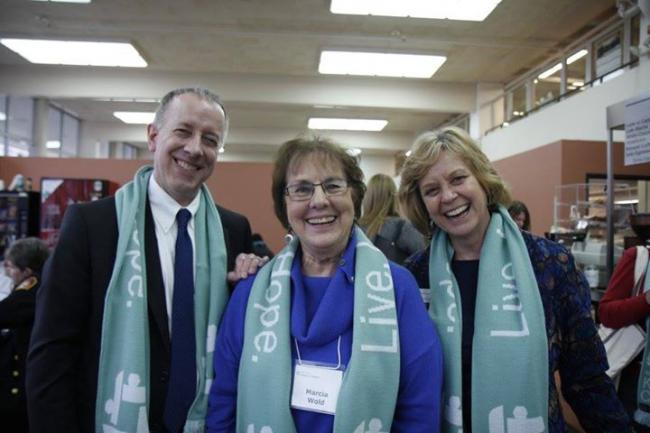Kidney disease survivor Marcia Wold advocates for National Kidney Month
Marcia Wold (center) with other patient advocates.
Mon, 03/02/2015
By Amanda Knox
Editor's note: This article originally appeared last week online. This version contains some clarifications and corrections.
We all know—by the green going up—that St. Patrick’s Day is just around the
corner. But did you also know that March is National Kidney Month? Maybe not, and perhaps that’s because a lot of us don’t give our kidneys much thought.
To get you reacquainted, the kidneys are two fist-sized organs in your lower back
beneath your rib cage. Their main function is to filter metabolic waste (like urea,
creatinine, and uric acid), excess water and impurities (like drugs) from your
bloodstream. They also regulate your body’s salt, potassium, and acid content,
release hormones that regulate blood pressure and control the production of red
blood cells, and produce an active form of vitamin D that allows your body to absorb calcium.
Those guys. It’s very important that they function. Otherwise, water and waste build up in your blood stream (conditions like edema and uremia), calcium is drained from your bones, and the rest of your tissues and organs are denied access to oxygen because your red blood count drops (anemia). We cannot survive without our kidneys, which is why it may trouble you to know that the majority of Americans who suffer from kidney disease—the lowered or loss of kidney function—don’t even know it yet.
That’s where patient advocates like Marcia Wold come in. Wold has been given a
second chance at life thanks to dialysis and a kidney transplant, and her means of giving back is to share the story of her experience with kidney disease so that others might be spared her fate, or worse. Wold survived the full gauntlet, and lives with the consequences. The recipient of a kidney transplant, Wold has to be extremely careful to protect herself against any kind of infection. She has to avoid physical contact with her cats—much less their litterbox. She must take three kinds of anti-rejection medication every day for the rest of her life.
Before the gift of a new kidney, Wold, like others with permanent kidney failure, had to undergo dialysis three times a week for five hours at a time. Dialysis is a process where a patient is hooked up to an artificial kidney, a machine. It requires a patient to be permanently installed with a fistula, a surgically created connection between an artery and a vein of the arm—from which their blood can be drawn out, filtered through the artificial kidney, and returned to the body. Apart from being an inconvenience to schedule so much time around a full time job, the process of removing and returning blood can cause painful cramping. Wold’s toes would curl in under her feet and she often heard whimpering from the other patients. “I wish it were possible for people to just come in to view the dialysis clinic,” Wold says. “It would help people realize that they need to take their health into their own hands before it’s too late.”
But the tragic twist to Wold’s story is that much of this could have been put off, or
even prevented. It is a regular part of one’s yearly physical for creatinine levels to be tested through lab work. Creatinine is one of the metabolic wastes filtered out of the blood through the kidney. If creatinine levels are above a certain amount, it is a sign of kidney malfunction. High blood pressure and protein in the urine are other tell-tale signs.
For years, Wold’s creatinine levels were slowly but surely rising, but she didn’t know what that meant or what she could do about it. Wold explains, “We don’t know what we don’t know. There’s a need to ask questions. If a doctor says to you, ‘Marcia, if your creatinine level goes up again next year, I’m going to refer you to a nephrologist,’ my questions should have been, ‘What is creatinine? What does it tell me? What do I need to do? How much at risk am I? What is a nephrologist?’ I didn’t ask any of those questions.”
At a Northwest Kidney Centers dialysis clinic, Wold was known for her positive
attitude. She “went to a happy place” via visualization during her treatments and
made every effort to not let dialysis prevent her from living a full life in between
those sessions. Eventually, a centers representative encouraged her to become a
patient advocate—an ambassador for the over 26 million Americans who knowingly or unknowingly are struggling with kidney disease. Her main message to the public at large is encouragement to be one’s own advocate, to be informed, and to partner with physicians who will answer your questions and discuss your options.
In light of National Kidney Month, the National Kidney Foundation is offering health activities—like free screenings and interactive Q&A with the Foundation’s Chief Medical Officer, Dr. Joseph Vassalotti, via Twitter on March 14th in observance of World Kidney Day (March 12), from 12-2pm ET—to promote awareness of kidney health, disease, and the risk factors in between. For more information, visit www.nwkidney.org.


